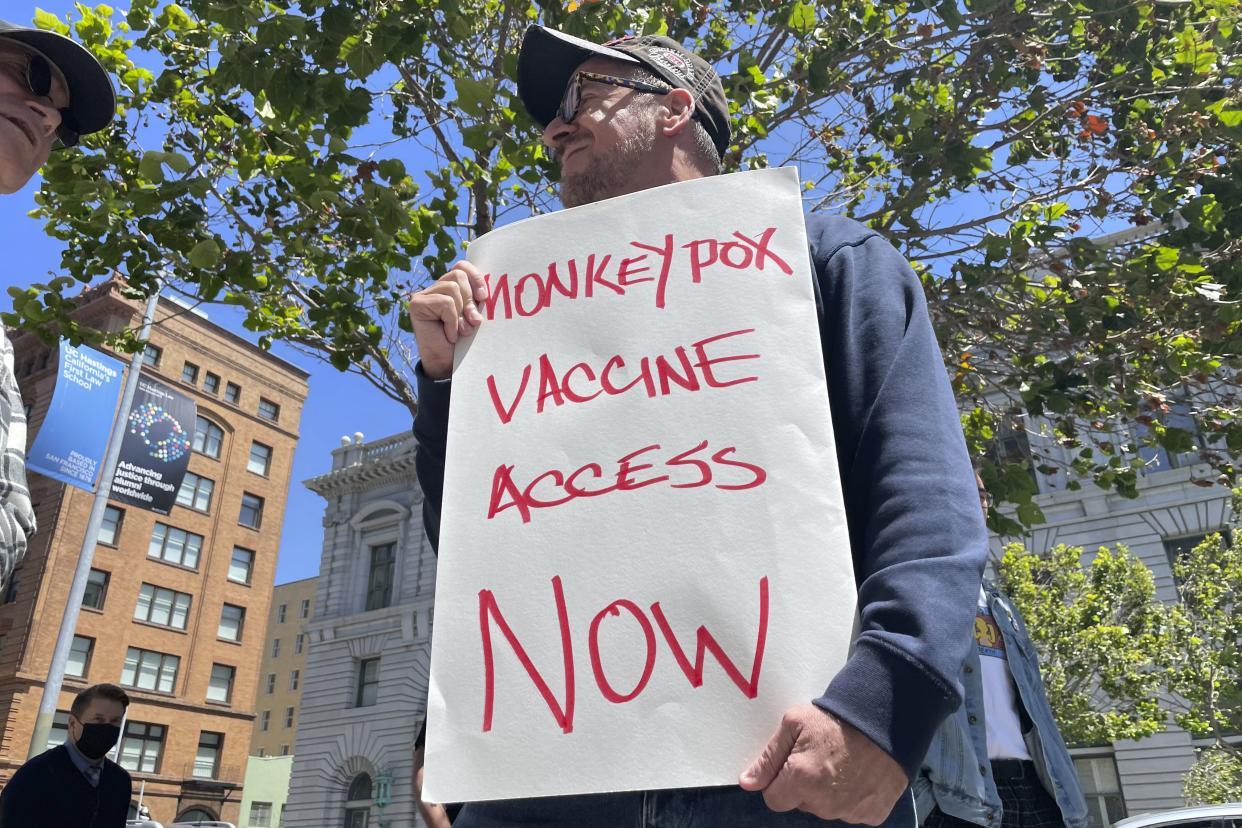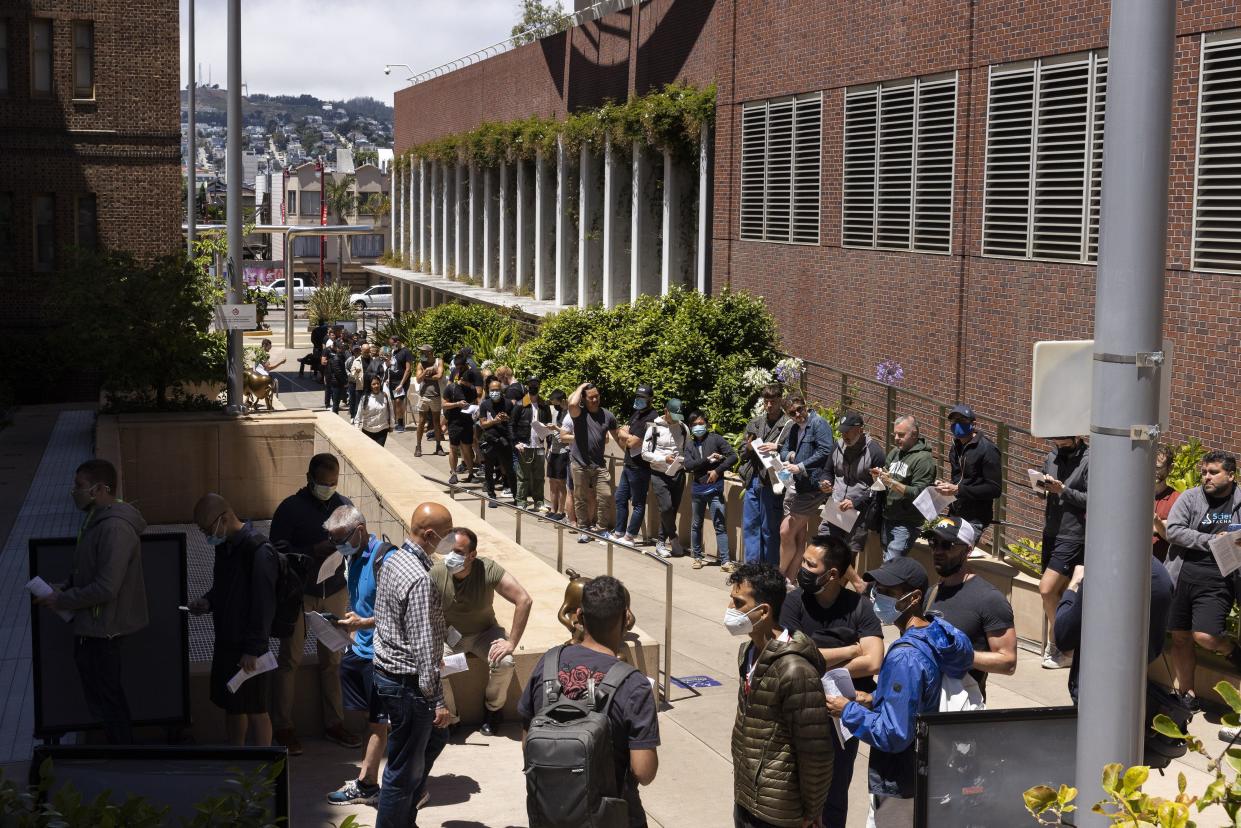San Francisco declares health emergency over monkeypox as cases rise amid vaccine shortage
San Francisco declared a state of emergency to stem a rapidly rising tide of monkeypox infections, the mayor and city public health office announced on Thursday.
The move will enable public officials to “expedite and streamline the availability of resources to better respond to this developing health emergency,” the mayor’s office said.
“San Francisco showed during COVID that early action is essential for protecting public health,” Mayor London Breed said. “We know that this virus impacts everyone equally — but we also know that those in our LGBTQ community are at greater risk right now. Many people in our LGBTQ community are scared and frustrated. This local emergency will allow us to continue to support our most at-risk, while also better preparing for what’s to come.”

A man holds a sign urging increased access to the monkeypox vaccine during a protest in San Francisco, July 18, 2022. (Haven Daley/)
The legal action, which goes into effect Monday, will speed up the deployment of resources by enabling the city to accelerate emergency planning, streamline staffing, coordinate city agencies and pave the way for future reimbursement from the state and federal governments, the announcement said. Officials also hope to raise awareness on how to stop the spread.
There are at least 261 confirmed cases of monkeypox in the city, the San Francisco Department of Public Health said. In California overall there are 799 cases, with more than 4,600 in the U.S. and 19,000-plus in 76 countries.
With 30% of all California cases concentrated in the Bay Area city, “San Francisco is an epicenter for the country,” city public health officer Dr. Susan Philip said.
“We need to be prepared, and this declaration will allow us to serve the city better,” Director of Health Dr. Grant Colfax said. “Our COVID-19 response has taught us that it is imperative that we mobilize city resources. The declaration helps us ensure we have all the tools available to augment our outreach, testing and treatment, especially to the LGBTQ+ who remain at highest risk for monkeypox.”
Vaccine rollout has been another concern, and the health department said the city will receive 4,220 doses this week, after requesting 35,000. This week’s batch will make a total of 12,000 doses the city has received, officials said.

People stand in long lines to receive the monkeypox vaccine at San Francisco General Hospital in San Francisco, July 12, 2022. (Jessica Christian/)
The virus, usually endemic in some African countries, made its way to Europe and then the world after rave parties in Spain and Belgium involving sex between men. That was its entry point into the rest of the world, but health experts warn that transmission comes via close contact, not necessarily related to same-sex activities.
The World Health Organization declared the virus a global health emergency last weekend, and the U.S. government is possibly set to do the same. The last time WHO did so was in declaring the COVID-19 pandemic in March 2020.
Local officials and LGBTQ advocates welcomed the move, given what is perceived as a slow federal response and a shortage of vaccines that has seen San Francisco cancel second vaccine doses so as to spread out a thin supply.
“Especially coming out of, still, 2½ years into a pandemic, it’s just a very disappointing response for the first larger-scale public health crisis we’re facing coming out of that,” Tom Temprano, political director of San Francisco-based Equality California, told The Associated Press after his follow-up shot was canceled.
“Community-based organizations like San Francisco AIDS Foundation have been ringing the alarm for many weeks now about the crisis that our community is once again in,” Tyler TerMeer, chief executive officer of the San Francisco AIDS Foundation, told the San Francisco Chronicle.
“I strongly support our local public health authorities’ decision to declare a public health emergency for Monkeypox, and I think it’s important for San Franciscans to understand that this isn’t about alarmism but preparedness,” Supervisor Matt Dorsey said in the health department’s statement. “It’s a prudent step, which aligns with recent moves by the World Health Organization and the U.S. Department of Health and Human Services.”
While monkeypox — a name WHO calls a misnomer and is trying to change — has tended to manifest as an STD, transmission is not relegated to sexual contact so much as proximity, health experts stress. Prolonged skin-to-skin contact such as sex, kissing, breathing at extremely close range, and sharing bedding and clothing are the means of transmission, which can happen with anyone who’s infected.
The virus’s hallmark is postule-filled skin lesions, which appear after a spate of flu-like symptoms including fever, body aches, chills and fatigue. While rarely fatal, the disease can be very painful.
With News Wire Services
